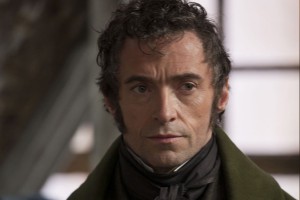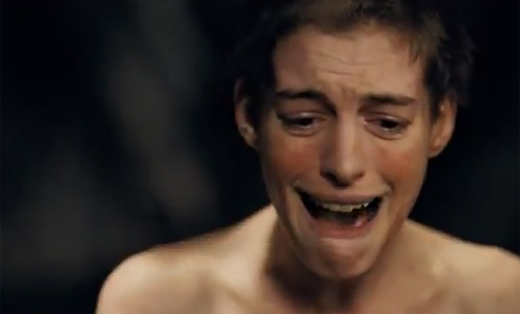Directed by Tom Hooper
Written by William Nicholson, Alain Boublil and Claude-Michel Schönberg, and Herbert Kretzmer
United Kingdom, 2012
At some point in cinema history, it became bad form to make movie musicals without being self-aware or self-referential. The concern must spring from the perceived stumbling block people have when they watch musicals, boiled down to one simple question: “Sure, but why are they suddenly singing?” The transition from spoken dialogue to speeches or monologues that are belted all the way to the rafters is, perhaps, more pronounced on the silver screen. With the long-awaited movie version of Les Misérables, the immensely popular musical based on Victor Hugo’s epic novel, director Tom Hooper has chosen to strip down the grand-scale show so that audiences aren’t stymied by the musical’s inherently lusty operatic style. This approach is only somewhat successful; the film almost works in spite of itself.
Hugh Jackman plays Jean Valjean, a Frenchman whose story begins in 1815 as he finally finishes a 19-year stint of slave labor all because he stole some bread to feed his family. He breaks his parole immediately, but is set on the path of God by a kindly bishop who helps him start a new life as a factory owner and mayor of a small town. Although he’s a changed man, Valjean is still hunted by Inspector Javert (Russell Crowe), a dogged policeman who refuses to allow this prisoner’s new outlook on life affect his duty to the law and to God. Before Valjean evades capture by Javert, he comes in contact with Fantine (Anne Hathaway), a young woman forced into prostitution to help her daughter Cosette survive, and pledges to protect the girl any way he can. Eventually, the lives of Valjean, Cosette, and Javert are entangled in the June Rebellion of 1832, as the downtrodden lower classes seek to fight back against the upper crust.
Les Misérables is a mammoth production, a story broad in scope and scale. At least, it should be. But Hooper, fresh off winning the Oscar for The King’s Speech, along with screenwriters William Nicholson, Alain Boublil and Claude-Michel Schönberg, and Herbert Kretzmer (the latter three wrote the stage show), has actively decided to strip the show to its bare minimum. The deliberate choice is likely present to emphasize the intimacy of this tragic tale, to show us the pain permeating through Jean Valjean, Fantine, Cosette, Marius the young rebel, Eponine pining after this young man, and more. However, as displayed here, it only serves to heighten whatever flaws the exemplary Broadway musical already has. For example, the subplot focusing on Marius (Eddie Redmayne) and Cosette (played by Amanda Seyfried as an adult), the star-crossed lovers, misfires entirely because once the action shifts to Paris, Cosette is in roughly 15 minutes of the film. Seyfried is fine in her few scenes, but it’s that much harder to buy love at first sight when the paramours barely get any screen time together. Though the show isn’t much different in this respect, it’s that much more glaring and distracting on the big screen.
Much has been made in advance of Les Misérables’ release that the actors sang live on set, as opposed to recording their songs in a studio and having that audio play on the soundtrack. This isn’t a revolutionary idea (the recent musical Across the Universe also employed the tactic), yet still refreshing in concept. And maybe in some big-screen musicals, the execution would be fitting. But the downside to using live audio on your soundtrack is that the performers leave nothing to chance, so we’ll hear their greatest and most painful moments, often side by side. And frankly, though it’s easy to see why Hooper would fight for live audio to go hand in hand with a more in-your-face approach, Les Misérables isn’t a musical that needs to be tinkered with in translating it to cinema. The songs are frequently swooning and soaring, epic in length and creation. Attempting to bring the tale down to Earth, though keeping all of the memorable musical flourishes, is nigh impossible, a fool’s errand. Even if it weren’t, only some of the performers’ voices stand up to a warts-and-all evaluation.
Anne Hathaway, as Fantine, is the clear victor among all of the performers, the true standout. (Note that she’s in just a bit more of the film than Seyfried, and read into that what you like.) Her showstopping moment, where she sings “I Dreamed A Dream,” a ballad bemoaning her character’s current place in the world versus her hopes as a youth, is the perfect blend of realism and artifice. In this five-minute, single-take sequence, Hooper is able to capture exactly the right mix of bombast and hushed, reverential pain. Jackman is mostly adequate as Valjean, though it’s hard to fault him as you can see how intensely hard he’s trying to carry the film in each of his scenes. Redmayne probably delivers the best performance in the film, his Marius wracked with high and low emotion throughout, though his singing fluctuates between being sweet, and almost Muppet-like. Crowe is, though not Pierce-Brosnan-in-Mamma–Mia-level bad, a bit of a weak link. Physically, he’s appropriately imposing; the trouble is that his singing voice just isn’t powerful enough to sell songs like the excellent “Stars.” In two smaller roles, Sacha Baron Cohen and Helena Bonham Carter are surprisingly enjoyable as the Thenardiers, the greedy innkeepers taking care of Cosette when Valjean comes to call. They’re not much more than a welcome bit of comic relief, but their performances are more lively and spirited than anyone else’s.
This aside, Les Misérables is a smoothly paced film, one that fans of the show may end up liking if only because it’s so damn easy to fall for the music. What Les Misérables is not, however, is a well-shot film. Relying on cinematographer Danny Cohen, Hooper gives you a Christmas present in the form of more close-up shots of some big-name stars than you could have possibly wanted. If you wanted to count how many freckles are on Redmayne’s nose, your dreams are coming true here. Some of the time, Hooper’s reliance on single takes works, as in the aforementioned “I Dreamed a Dream” sequence. But the only reason it works there is because the shot not only lasts a few minutes, it stands still. Too often, the camera swoops in and around each actor, to the point where you’re worried it might hit someone in the face. Trying to bring the audience closer to the characters isn’t a bad idea; Hooper just goes too close too often.
As it should be, Les Misérables is an ambitious film made by an ambitious director. Here, Tom Hooper is like a baseball player intent on hitting each pitch thrown at him out of the stadium. Not even the best hitters can do that, so there are a few home runs here, but a lot of strikeouts as well. And at the heart of the problem is Hooper’s belief that audiences just aren’t in the mood for a traditional movie musical anymore. Almost all of the dialogue in the stage version of Les Misérables is sung; here, some of that dialogue is half-spoken, half-sung, as if the performers were temporarily possessed by the spirit of Rex Harrison. Combating this foolish notion that people don’t like musicals anymore is a patently incorrect rejection of suspension of disbelief. Accepting that the characters in a film are singing to each other or themselves is the same as accepting that a grown man would fight crime dressed as a bat, or that dwarves could band together to fend off a giant dragon. Going to the movies means we must suspend our disbelief, no matter the genre. This new version of Les Misérables doesn’t want us to fully buy into the notion that Jean Valjean, Inspector Javert, and the others would sing to the high heavens. This movie almost breaks its back trying to push back against its origins, when it could’ve been as epic and full of grandeur as people once dreamed.
— Josh Spiegel





